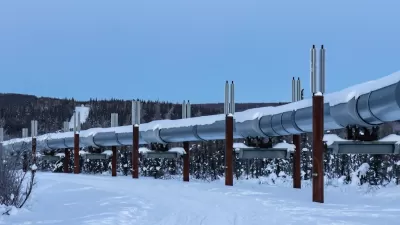The fossil fuel industry has convinced the public that aggressive carbon reduction will harm the economy. Au contraire. The carbon reduction leader will secure its place at the top of the global economy, argues UrbDeZine Editor Bill Adams.
Somethings, in hindsight, are obvious, though not so much before. The beneficial impact on the economy of reducing carbon will be the next such thing, opines Bill Adams, a San Diego land use attorney and editor of UrbDeZine. The fossil fuel industry has managed to convince the country that the harm to their interests from conversion to clean energy will be a sacrifice shared by all. In fact, opines Adams, conversion to carbon neutral energy is inevitable. It is inevitable because the alternative is catastrophic for the planet. And because it is inevitable, so is conversion to carbon neutral energy sources.
Accordingly, the boom in carbon reduction technology is inevitable—it has already begun but will continue to grow exponentially. Thus, failing to act quickly and robustly in supporting carbon neutral technology will cause the United States to miss the opportunity to fully share in the economic benefits that will be bestowed on the technological leaders of the inevitable conversion. Adams asserts:
While the U.S. is still one of the top investors in carbon neutral energy, China is number one. Coupled with it’s manufacturing prowess, China stands poised to make the U.S. a customer rather than a producer or patent holder, while congress and state legislators do the bidding of the fossil fuel industry. Even some fossil fuel companies recognize the inevitability of addressing climate change, albeit in a Machiavellian manner: For example, ExxonMobile is promoting and investing in geo-engineering the climate by pumping sulfate aerosols into the atmosphere, at the same time it funds climate change skepticism. However, geo-engineering is widely considered a far more risky and inferior way to deal with climate change than carbon reduction. Thus, ExxonMobile hopes to profit by sinking the ship while owning the lifeboats.
Adams concludes:
This battle between Old and New, is not greens vs. greenbacks. It’s greens and new greenbacks, on the one side vs. old greenbacks, on the other side. The earth and economic growth are on the same side.
FULL STORY: Who will win the carbon reduction economy?

Planetizen Federal Action Tracker
A weekly monitor of how Trump’s orders and actions are impacting planners and planning in America.

Restaurant Patios Were a Pandemic Win — Why Were They so Hard to Keep?
Social distancing requirements and changes in travel patterns prompted cities to pilot new uses for street and sidewalk space. Then it got complicated.

Maui's Vacation Rental Debate Turns Ugly
Verbal attacks, misinformation campaigns and fistfights plague a high-stakes debate to convert thousands of vacation rentals into long-term housing.

Boulder Eliminates Parking Minimums Citywide
Officials estimate the cost of building a single underground parking space at up to $100,000.

Orange County, Florida Adopts Largest US “Sprawl Repair” Code
The ‘Orange Code’ seeks to rectify decades of sprawl-inducing, car-oriented development.

Maui's Vacation Rental Debate Turns Ugly
Verbal attacks, misinformation campaigns and fistfights plague a high-stakes debate to convert thousands of vacation rentals into long-term housing.
Urban Design for Planners 1: Software Tools
This six-course series explores essential urban design concepts using open source software and equips planners with the tools they need to participate fully in the urban design process.
Planning for Universal Design
Learn the tools for implementing Universal Design in planning regulations.
Heyer Gruel & Associates PA
JM Goldson LLC
Custer County Colorado
City of Camden Redevelopment Agency
City of Astoria
Transportation Research & Education Center (TREC) at Portland State University
Camden Redevelopment Agency
City of Claremont
Municipality of Princeton (NJ)





























